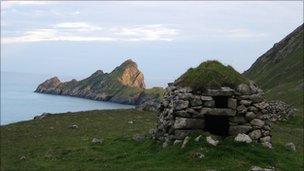Story of St Kilda prisoner Lady Grange up for award
- Published

Lady Grange lived in exile on the remote island of Hirta
A book about an aristocrat who was kidnapped and then taken to a remote island on the orders of her estranged husband is up for a literary award.
Margaret Macaulay's The Prisoner of St Kilda: The True Story of the Unfortunate Lady Grange is on a shortlist for a Saltire Society prize.
She is among six contenders for first book of the year.
The History of Orkney Literature by Simon Hall and Homecomings by Donald Paterson are also short-listed.
Other categories are book of the year, best research book and history book of the year.
The authors and books on the shortlists for each category can be found on the Saltire Society website, external.
Edinburgh-born Rachel Chiesley became Lady Grange on marrying James Erskine, Lord Grange.
His brother, John Erskine, the Earl of Mar, led the failed Jacobite rebellion of 1715.
The earl, who owned Braemar Castle in Aberdeenshire, had voted for the 1707 Act of Union.
He had also been Secretary of State for Scotland until 1714 but rose up against the authorities.
'Naughty ladies'
Lord Grange was also secretly sympathetic to the Jacobite cause but feared his wife, who was angered by his infidelity, would expose him.
The lord had her kidnapped and she was first taken to North Uist before sailing to Hirta, the main island on the St Kilda archipelago, 41 miles off the Western Isles.
Erskine claimed she had died and even a funeral was held.
The lady remained in exile for almost 10 years living among the islands' fisher folk and guga hunters - men who scaled sea cliffs to catch gannets for food.
It is said she managed to get a letter to friends in Edinburgh but they were unable to rescue her.
Lady Grange spent the last years of her life on Skye.
Dr Samuel Johnson, who produced the original Dictionary Of The English Language 250 years ago, is said to have told St Kilda's landlord that he might make the islands profitable if he let it be known it was a place for "naughty ladies".
The winners of the literary awards will be announced at a ceremony in the National Library of Scotland on 29 November.